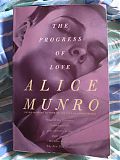
Alice Munro
The Progress of Love
To begin writing short stories is to hear Alice Munro’s name down every wide avenue. Alice Munro, unavoidable, Alice Munro. She seems to be the unanimous contemporary master of the short story. One only hears Chekhov’s name next to hers, “Alice Munro is the Chekhov of our generation.” So I had to discover for myself, what is so special about Alice Munro?
The most memorable description of her writing (from where I can’t remember) was a comparison of her stories to a great whale swimming just below the surface of the ocean. We only see the whale’s shadow. And so the emotional event of Munro’s stories is always lingering like a shadow below the surface of her words. We feel its presence long before we see it take shape and even then, we can’t make it out exactly. The whale passes, the story is over.
Another virtue is the way Munro juxtapositions past and present in many of her stories. One acts as a beam of light shining on the other, back and forth like the narrative was playing with flashlights. It is an attempt to coax the emotional event (for that’s how the main action seems to me) out, a show of the dorsal, a spray from the blow hole. In the story White Dump, an adult daughter visits her remarried father at their family’s cottage, and from somewhere come the events that led to her parents’ divorce. The memories do not come from the daughter nor the father nor even the mother who left, but from somewhere inside the story itself.
At parties, she flirted with men who did not seriously pursue her. (She had noticed that [her husband] was disappointed if she did not create a little stir.) Sometimes she imagined herself overpowered by these men, or others, a partner in most impulsive, ingenious, vigorous couplings. Sometimes she thought of her childhood with a longing that seemed almost as perverse, and had to be kept almost as secret. — White Dump
The story built up ever so well, the wife/mother hardly given a voice and then Munro unwraps sentences like that, gone as quick as they had come.
The general connecting theme to The Progress of Love is as the title suggests. It is the love of “ordinary” people in relatively “ordinary” situations that inevitably reveal the extraordinary in the lives we lead. They are quiet stories, in a way, which give them their loudness and their strength. And so I too have begun reverently saying her name, Alice Munro.
Commentary for The Progress of Love
· · · · · · · · · · · · · · · · · · · ·
1 On Monday 22 August 2011 Vincent wrote:
You have made me want to read her stories.